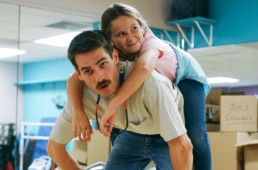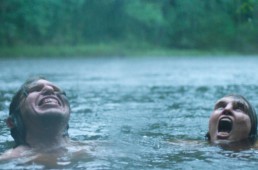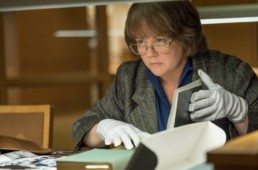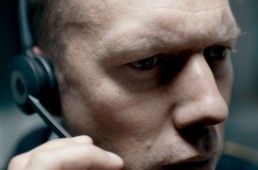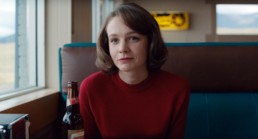'Thunder Road' Review: An Off-Kilter Look at Love and Loss
An impressive 12-minute long one-take sets the scene in writer/director/actor Jim Cummings' dark comedy, Thunder Road.
Aside from the impressive technical accomplishment of capturing this mammoth of a monologue, which is performed by Cummings alone, it's clear from the beginning that this is going to be a very off-kilter viewing experience. Emotionally in tune with the struggles of being both a parent and a child, Cummings creates a bittersweet love letter that speaks to the complexities of family dynamics while keeping the overall tone of the film interesting and unconventional.
Thunder Road is Jim Cummings' movie, through and through. He plays the fragile protagonist, police officer Jim Arnaud, and when we first meet him, he is delivering a heartfelt tribute to his deceased mother at her funeral. Dressed in his uniform, Jim uses his platform for a cathartic release of his pent-up regret about his past behavior of acting out towards his mother during childhood. He ultimately eulogizes her with an interpretive dance to Bruce Springsteen's "Thunder Road", providing a much-needed chuckle after nearly 10-minutes of grief-stricken sobbing.
As if losing his mother wasn't enough, Jim is also in the midst of a divorce, having issues at work, and struggling to connect with his young daughter, Crystal (Kendal Farr). After all, there is only so much advice a father can give his pre-teen daughter about boys and wearing makeup. Jim's unrelenting heartbreak is heavy, it seems as if he is never happy and that is a tough thing to sit through for an hour and a half. But Jim is resilient in his quest to give and receive love, which offers a silver lining during his struggle.
Directorial choices like these are what make 'Thunder Road' inventive both in front of and behind the lens.
A limited musical score adds to this dark comedy's overall feeling of unrest. When there is music, it comes from one lone, depressing violin, except for the beautiful sound of Bon Iver's "Skinny Love" performed by a string quartet in the film's final scene. That moment is sure to give anyone chills. This non-use of music is quite unconventional, and some may view it as flat. While there are moments that could have been aided by a more consistent score, the silence further adds focus to Cummings performance as an actor- distraction free.
Directorial choices like these are what make Thunder Road inventive both in front of and behind the lens. Cinematographer Lowell A. Meyer is patient with the long-takes and smooth with the subtle movements, breathing life into every scene.
Based off of and built upon Cummings' short film of the same name, which won the Short Film Grand Jury Prize at the 2016 Sundance Film festival, the 12-minute long short was quickly adapted into the feature-length film that is playing in theaters today. Thunder Road was also honored with the SXSW 2018 Feature Film Grand Jury Award and was in the top five best-reviewed films at Cannes this year where it premiered internationally.
'Thunder Road' is not rated. 92 minutes. Now playing at Laemmle theaters in Glendale, Pasadena, and Santa Monica and available on VOD.
David Majzlin: "Don't use music as a crutch"
David Majzlin is a busy guy, just ask director Paul Weitz.
In-between work on the award-winning TV show Mozart in the Jungle and his recent project Bel Canto, both of which were lead by Weitz, the Emmy-nominated composer has been immersed in creating classical tunes for the big and small screen. Wanting to become a musician since he was two-years-old, Majzlin is literally living his dream as he continues to expand his repertoire, both in working with filmmakers and learning new instruments. In our exclusive interview, I talked with Majzlin about working with the legendary opera singer Renée Fleming and how he discovered Bel Canto's key instrument at a party. We begin:
On deciding between a career as a composer or film critic.
"I like to say that I got my start when I was two or three and I destroyed my parents piano. The name of my publishing company is Toy Hammer Music and that's because my parents had this piano with ivory keys on it and I really beat it up with this toy hammer. They thought I was just playing until they came into the room and there are ivory keys all over the floor. That really freaked them out.
But all joking aside, I studied music my whole life. I had piano lessons growing up and then in my teens, I started playing guitar and bass. I always absorbed a lot of different kinds of music. I never had one set "style."
And then I started scoring films in New York. I actually did my masters in a film criticism program at New York University. I wasn't sure a hundred percent if I was going to do music, I loved music and film, and I had a really hard time deciding which passion I wanted to pursue."
On working with opera legend Renée Fleming (who dubbed over Julianne Moore's voice).
"The greatest challenge is always time.
I was working on Mozart in the Jungle simultaneous to working on Bel Canto and I normally I wouldn't do two projects like that at the same time, but they were both for [director] Paul Weitz. You don't get a lot of time to write these things, [the production] has to move very, very quickly. You know what they say- you never finish a film, you just run out of time or money.
That's definitely the case with writing music for a film. We get maybe 8 to 12 weeks to work on everything. There were two challenges with this film. One is that Bel Canto is a film about music featuring someone as prolific as Renee Fleming. I had to be very careful not to overstep the composition because her voice is what the film is about, the whole idea of classical music as a conduit for love.
I had to be very careful given that Renee's voice is such a powerful instrument on its own, and then you have Julianne Moore, who's spectacular, and I didn't want to step over her. So that's the challenge."
Never heard of the "Timple"? Neither had David.
"Bel Canto takes place in an undetermined Latin American country. We don't say what country it is, so I needed to find an instrument that wasn't specific to a certain country. Like if I picked the Berimbau, for example, the Berimbau is definitely Brazilian, the Tarang is Indian, etc.
I was at a party once and I met this girl, a musician, who was moving to Mexico and was selling this instrument. Well, actually, it wasn't for sale at first but I convinced her to sell it.
It's called a Timple, which is often used in the Canary Islands and in Latin America. I'd never heard of this instrument but when I went to her place, I saw it on the wall and it really spoke to me. I got her to let me play it and I just fell in love. It was like love at first sight. I just knew that this is the instrument that's going to serve for the whole film. This is going to be my palate. This is going to be unique."
On telling directors not to use music as a crutch.
"No matter who the director is unless the director is a musician, there's always a sense of uncertainty and trepidation because music composition is not their language. The directors are visually oriented people. It's sort of like you're taking their baby to college and you're like, 'Don't worry, it's going to be better!'
I ask the editor to edit for as long as possible without any music at all. I try to get them to get all the way to the end with no music that way you can see what's missing. That way you don't use the music as a crutch. A lot of times, the number one request I'll get for music is, 'Oh, the scene is boring or it's slow or the energy's low' and I'm always thinking, 'Well, maybe you should cut that scene because if it's slow then why is it in there?' You know what I mean?
You have to know why you're using that music. If you don't, then you run the risk of people not understanding what you're intending."
Listen here:
https://open.spotify.com/artist/5Hz5BSLJuxBF7dWNIwfhgs
'Border' is Cinema Magic at Its Best
The best way to experience Border is by not knowing anything about Border. Let me explain...
Iranian-Swedish director Ali Abbasi takes the seemingly-innocent genre of romantic fairytales and with a conjuring of dark material so weird it'll make your head spin, he creates one of the most disturbing films of the year. It's essentially a troll love story set in the Swedish countryside, but Border's hyper-realistic aesthetic combined with a jaw-dropping, phenomenal performance from Eva Melander makes this film a sight to be seen.
Tina (Melander) lives a rather solitary life. She works as a border patrol agent and, due to her unnatural dog-like instinct to detect shame, guilt, and rage through her sense of smell, she is highly successful at catching smugglers with secrets. It should also be mentioned that, along with these unique capabilities, Tina's appearance is noticeably different from her peers. Due to a chromosome deformity, her features are extremely masculine with a protruding forehead and unruly body hair. She is the definition of a societal outcast but continues to live her life, for the most part unaffected, but surrounded by her manipulative roommate Roland (Jörgen Thorsson) and her ailing father (Sten Ljunggren).
Border's ability to teeter between fantasy vs reality is cinema magic at its best.
Tina's daily routine is interrupted when she meets and quickly develops an unexplainable connection to a mysterious man whose smell she cannot figure out. A husky man with features similar to her own, including crooked and underdeveloped teeth, Vore (Eero Milonoff) is an enigma. After an agonizing and emotional back and forth on Tina's end, she finally allows herself to get to know the man who she feels magnetically drawn towards. While getting to know him, Tina begins to discover who she really is and starts to realize that what she is discovering will change her life forever.
There is so much to unpack in Border, both in front of and behind the camera. Most notably is Eva Melander's total transformation into this troll-like creature, Tina. Though her character has a heart of gold and a humanistic desire to help others in need, it is overpowered by her awkwardness. One can't help but focus on her exterior with a judgemental distraction. Melander's performance doesn't rely on the phenomenal appearance-changing prosthetics she wore- she taps into the heart of the character and is no holds barred when it comes to the vulnerability of raw emotion. She leaves nothing to be desired, making her performance nothing short of Oscar-worthy.
Audible nuances gnaw at you like incessant gnats in the summer- the sounds of open-mouthed chewing, heavy panting, and buzzy mosquitoes contribute to the film's intentional discomfort. The aesthetic of the locations used, combined with these seemingly minor additional details are what makes the world of Border so eerily realistic. It's easy to forget that beyond the lush, dense forests and murky waters, or beneath the layers of scratchy wool sweaters and out of control body hair, there is an entire film crew behind the scenes and a director calling "action."
Border won the Un Certain Regard Award at the 2018 Cannes Film Festival and continued to shock and awe audiences during its festival run. As Sweden's official Oscar entry in the Best Foreign Language category, Border's ability to teeter between fantasy vs reality is cinema magic at its best.
'Border' is rated R for some sexual content, graphic nudity, a bloody violent image, and language. 110 minutes. Opening this Friday at ArcLight Hollywood.
'Can You Ever Forgive Me?' Review: Writer Gone Wrong
They say imitation is the best form of flattery, but things get sticky when the flattery turns into forgery.
American writer Lee Israel, who passed away in 2014, knew this repercussion all too well. A former celebrity biographer who penned literary works for Katherine Hepburn and Estée Lauder, Lee's infamy came not from her books, but from her late in life bad behavior. In her confessional memoir turned film adaptation, directed by Marielle Heller (The Diary of a Teenage Girl), Can You Ever Forgive Me? stars Melissa McCarthy stars as the desperate and damaged Lee Israel in a dynamic role that is sure to land on the early Best Actress prediction lists.
When we are introduced to Brooklyn-born Lee Israel (McCarthy) in the early 90s, she is living in the shadow of her previous biographies and is struggling to land another NY Times best-seller. Her agent (Jane Curtain) doesn't return calls, her rent is due, and her 12-year-old cat needs surgery. Anxiety-ridden and depressed, Lee turns to alcohol for the temporary escape from the reality of her situation, which is that she needs money, and fast. What starts as an exercise in creative writing soon leads Lee to embark on a dark and unethical secret of creating forged letters from literary greats and selling them to bookstores and art collectors as authentic works for cash. For a while, it worked... until it didn't.
A recluse by choice, Lee's uncharacteristic friendship with fellow author Jack (Richard E. Grant) is the film's emotional anchor and comedic relief. Contrary to Lee's brash and brazen ways, Jack is larger than life and flamboyant in both his personality and mannerisms, making him a character we can't help but love. Lee ropes Jack into helping with her illegal operation when the FBI starts catching wind of her scheme which now, coupled with Jack's sales schmoozing, produced over 400 fake letters sold for hundreds of dollars apiece.
The story of the notorious Lee Israel deserved a big screen production, and I would venture to guess that she would be pleased to see her name back in headlines.
Melissa McCarthy completely transforms into Lee Israel, from her frumpy attire to unflattering bowl haircut. Her performance really shines towards the end of the film when she is forced to take accountability for her actions and face the repercussions, for both her criminal ways and in her strained friendship with Jack. It is clear in Can You Ever Forgive Me? that Lee was a complicated woman and McCarthy explores all these layers throughout the film. Lee's sympathy toward the people she duped was limited, as she said in her memoir "I still consider the letters to be my best work.” It's this attitude that makes Lee not necessarily a likable character, but a very relatable one. A traditional protagonist who does a 180 after learning a life lesson was clearly never director Marielle Heller's intention, and this complex character arc brings out the best in McCarthy's dramatic capabilities, perhaps making one of her strongest performances to date.
Literary forgery isn't the most exciting crime to see play out on screen, and the thrill of typing letters is only so adrenaline-producing. The overall story is a fascinating one, though watching it unfold feels a bit slow at times, anti-climactic even. However, the story of the notorious Lee Israel deserved a big screen production, and I would venture to guess that she would be pleased to see her name back in headlines.
106 min. 'Can You Ever Forgive Me?' is rated R for language including some sexual references, and brief drug use. Now playing at ArcLight Hollywood and The Landmark.
https://www.youtube.com/watch?v=UvJIaNsf_bY
'The Guilty' Review: A Masterclass in Suspense
The last place one would expect to find an emotional connection is on the other end of an emergency services phone call.
There's an unsettling anxiety that runs rampant throughout call centers worldwide as life and death decisions are made in a matter of seconds. And it is from this chaos that writer/director Gustav Möller creates an unconventional, slow-burn explosion of passion in the dramatic thriller, The Guilty (Den Skyldige). A powerful juxtaposition of calming urgency, The Guilty is a masterclass in suspense with one of the best stomach-lurching shocks I've seen all year.
Jakob Cedergren plays Asger Holm, a Danish police officer acting in an emergency operator role, due to a mysterious suspension, until he is able to patrol the streets again. Fifteen minutes before his shift is scheduled to end, Asger receives a rather unusual call from a clearly troubled young woman. A sense of protectiveness kicks in and he is able to discreetly dissect information from Iben (Jessica Dinnage) about her situation, which turns out to be a kidnapping in progress. Taking the call more personally than the others before it, Asger panics when the call is suddenly disconnected, and frantically begins doing everything he can- ethically and not- to figure out the missing pieces of information and bring Iben home.
Similar to Tom Hardy's performance in 'Locke' (another fantastic one-man movie), this is Cedergren's movie and he commands every moment.
The Guilty is a race against time, playing out in real time. The audience is thrust into the drama the second the film begins, and the high-stakes intensity doesn't let up for a moment. For as sedentary as the "action" is, the film's unique ingenuity comes from what is absent on screen. Like Asger, the audience is hearing the situation unfold through the headset, and we use our imagination to visualize what is happening in the world of our protagonist and the victims.
Asger becomes more than just a vessel of relaying information, he becomes a self-appointed voice of reason, even if he oversteps his role as an operator in doing so. He loses his calm, cool, and collected demeanor as he passionately crosses ethical boundaries and although the intent is pure, he slowly begins to make promises that are beyond his control and lose himself to his imagination.
This is a vehicle for Jakob Cedergren to show his range as an emotionally tortured man in a career that disapproves of personal attachment, and his performance is spellbinding. Similar to Tom Hardy's performance in Locke (another fantastic one-man movie), this is Cedergren's movie and he commands every moment on screen. The film's overall aesthetic is dark and looming, taking place all in one room, yet it never feels claustrophobic or stalled. In fact, the film pulsates with energy.
The Guilty is Denmark's official Oscar entry in the Best Foreign Language category and has already amassed a slew of awards and nominations, including the Audience Award at the Sundance Film Festival. Patience is a virtue in The Guilty, and the payoff is phenomenal.
'The Guilty' is rated R. 95 minutes. Opening this Friday at Laemmle's Royal Theater.
'Wildlife' Review: A Stunning Directorial Debut from Paul Dano
The last time Paul Dano was celebrated at the Sundance Film Festival, he was riding waves atop Daniel Radcliffe's farting corpse like a jet-ski in 2016's Swiss Army Man.
The last time Zoe Kazan was at Sundance, she was starring opposite Kumail Nanjiani in the beloved romantic comedy, The Big Sick. This year, the creative duo and real-life couple returned to the festival with a movie of their own, a passion project of Dano's which he directed and co-wrote with Kazan. Adapted from the 1990 Richard Ford novel, Wildlife makes its world premiere in the U.S. Dramatic Competition category and marks Dano's directorial debut.
Wildlife tells the story of a small town nuclear family in 1960s Montana. Jerry (Jake Gyllenhaal) and Jeanette (Carey Mulligan) live a simple life: he works on a golf course, she's a homemaker. Their 14-year-old son Joe (Ed Oxenbould) attends public school and struggles to meet friends, a by-product of the family's consistent moving around the country due to Jerry’s flighty nature and always-changing career paths. After an unexpected layoff not only hurts his financial stability but also his pride, Jerry makes a spur of the moment decision to uproot his life and join a nearby firefighting brigade that is battling an uncontrollable forest fire close by, leaving his small family behind for an unknown period of time.
As the movie shows through the limited but observant perspective of Joe, his mother edges ever closer towards the brink of unforgivable resentment and finds herself coping in ways a married woman shouldn’t. From getting a part-time job to exploring an extra-marital affair with a client (Bill Camp), she slowly discovers her own independence. As Jeanette begins to figure out what she really wants out of life, this leaves Joe, still waiting for his father's return, to be the emotional sounding board for his family. Witnessing his parent’s marriage fall apart right before his eyes is devastating, and even more so because of how much his parents each depend on him to be the anchor.
Dano certainly proves that he can command a tough yet tender film both technically and creatively.
It’s obvious that every detail of Wildlife has been carefully crafted from the eyes of a passionate artist. From the 1960s costumes to every detail of production design, the ambiance of the film screams warmth and heart, even if its central characters struggle with those same virtues. Here, Dano proves that he has not been an idle actor on all the movie sets he's been on, showcasing a strong visual style all his own (with maybe some compositional influences from P.T. Anderson). Every frame of Wildlife looks like it was lifted from a Norman Rockwell painting, the sweeping cool blue hues give a layer of sophisticated authenticity to this quiet yet powerful indie drama.
Beyond the film's visual style, Dano’s influence is also readily apparent in his direction with his actors. Wildlife is very much an “actor’s movie” – long, uninterrupted takes give the characters time to go through multiple emotions in a single setting; we see Joe work through feelings from confusion to submission, Jeanette from resentment to independence, and Jerry from disillusion to wild passion throughout the course of the movie. And this long-form character development works wonders here. While Gyllenhaal and Mulligan's star power burns bright, their flawed characters connect effortlessly with audiences, allowing us to see the same struggles in both of them that we can see in ourselves. A fantastic leading performance from Ed Oxenbould grounds the film in the dark reality of outgrowing relationships.
It will be interesting to see Dano and Kazan's film-making path post-Wildlife, which is a confident debut in and of itself. Dano certainly proves that he can command a tough yet tender film both technically and creatively. I, for one, can’t wait to see what he does next.
This review originally ran on January 24th, 2018, during the Sundance Film Festival
104 minutes. 'Wildlife' is rated PG-13 for thematic material including a sexual situation, brief strong language, and smoking. Opening this Friday at ArcLight Hollywood and The Landmark.
Announcing the World Premiere of 'Bali: Beats of Paradise' (Exclusive)
Cinemacy is excited to exclusively announce the world premiere of the original documentary, Bali: Beats of Paradise.
The film, running 55-minutes long, is a colorful and inspiring celebration of Balinese culture and gamelan music, spotlighting Nyoman Wenten - the renowned Indonesian composer who spent most of his life paying homage to the sacred but shrinking tradition of Balinese music and dance.
Featuring Grammy Award-winner Judith Hill (20 Feet from Stardom), Bali: Beats of Paradise is a fusion of cultures, sounds, and an immersive experience like no other. Wenten and Hill join forces to reignite gamelan - Bali’s rhythmic style of classical music - by blending classic funk with the beats of Bali to create a distinctive sound for a new piece of music she’s composing. The final result is an epic music video that catapults gamelan into the digital age.
Distributed by Sun and Moon Films and directed and produced by Livi Zheng (Brush With Danger), Bali: Beats of Paradise also makes for the perfect celebration on this Female Filmmaker Friday.
'Bali: Beats of Paradise' will have its world premiere at The Samuel Goldwyn Theater in Beverly Hills, CA on Wednesday, November 7, 2018. The film will also open exclusively in Los Angeles at the Laemmle Theater and at the Cinema Village in New York for an exclusive run beginning Friday, November 16.
For more information about the film, please visit www.BaliBeatsofParadise.
'The Hate U Give' Review: No Justice, No Peace
The Hate U Give is an adaptation of a YA novel written by Angie Thomas, but standing out from other Young Adult fiction dealing with societal problems while coming of age, the inspiration for this film comes from a rather surprising source.
A divisive figure in contemporary hip-hop, Tupac Shakur and his activism in support of the black rights movement is the driving force behind this big screen adaptation. Regarded as a visionary and disruptor of societal norms, Thomas found inspiration in his infamous acronym, "T.H.U.G. L.I.F.E.", which has a much deeper meaning than literal "Thug Life". The saying stands for "The Hate U Give Little Infants Fucks Everyone," meaning, how society treats its children will be a direct reflection on how they treat society when they come of age. This is where the story of The Hate U Give begins.
Starr Carter (Amandla Stenberg) is a high school teen stuck between two worlds. At her home in Garden Heights, a rough and predominantly black neighborhood littered with drugs and gangs, she is seen as an outsider. At her private high school in the wealthier and white part of town, she is seen as a diversity statistic. Despite her personal struggles, the support from her family never falters. From a young age, her father (Russell Hornsby) always told her about the power and pride she and her brothers should feel as a young black person in America, despite the injustice their people face every day. When Starr witnesses the shooting death of her unarmed best friend Khalil (Algee Smith) by a white police officer, her world is turned upside down.
As the only witness to Khalil's wrongful death, Starr feels pressure from the community and social justice worker April Ofrah (Issa Rae) to testify against the officer in court. Starr's mother (Regina Hall) wants Starr kept of the spotlight to prevent unsolicited attention, especially from local gang lord leader, King (Anthony Mackie). Add to this, Starr's ignorant high school friends who see attending a Black Lives Matter rally as a great excuse to cut chemistry class. Struggling to make sense of her new normal, Starr is faced with a life-changing decision: stay quiet and let life pass her by, or stand up and speak her truth.
'The Hate U Give' is a heartbreaking and emotionally taxing account of one young African American woman's struggle to fit in and the burden she carries as a result.
Amandla Stenberg gives a groundbreaking and emotionally stirring performance as the young protagonist, Starr. In nearly every scene, tears stream down Stenberg's face and we can't help but feel our hearts break along with hers. Her range as an actor is on full display as she brings life and powerful charisma to every moment. Equally as affecting is Russell Hornsby's performance as her protective father. His tough exterior protects his gentle heart as he puts his family's well-being above his own, claiming that family is the only people he lives and dies for.
The Hate U Give is hard to watch, especially being a white woman who is critically aware of being in the fortunate position of not being faced with violence and a cultural identity crisis on the daily. Just being female in a male-oriented world can come with its own set of restraints and hurdles. In this case, director George Tillman Jr.'s exposé is an eye-opening account of an all too familiar scenario, and just because we may not like what we see, doesn't mean we should turn away and pretend it's not happening. To that point, I hope The Hate U Give is able to expand its reach beyond its target audience of young people of color, and land on the radars of varied ethnicities and ages. To the African American community, The Hate U Give is just preaching to the choir... this is the type of film that everyone would benefit from seeing.
A timely conversation centering around the Black Lives Matter movement and the injustice of racial profiling within law enforcement and beyond, The Hate U Give is a heartbreaking and emotionally taxing account of one young African American woman's struggle to fit in and the burden she carries as a result.
'The Hate U Give' is rated PG-13 for mature thematic elements, some violent content, drug material, and language. 132 minutes. Now playing in select theaters, including ArcLight Hollywood and AMC theaters and expanding everywhere Friday, October 19th.

